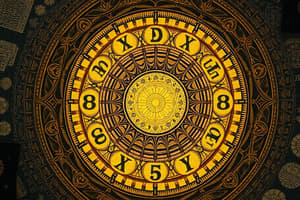Podcast
Questions and Answers
Which number set includes all positive whole numbers but excludes fractions?
Which number set includes all positive whole numbers but excludes fractions?
- Rational numbers
- Natural numbers (correct)
- Whole numbers
- Integers
What is the primary focus of differential calculus?
What is the primary focus of differential calculus?
- Finding averages of data sets
- Solving for unknown variables in equations
- Calculating areas under curves
- Studying rates of change (correct)
Which operation would you use to evaluate the expression $3^4$?
Which operation would you use to evaluate the expression $3^4$?
- Subtraction
- Multiplication
- Exponents (correct)
- Addition
In trigonometry, which function is NOT considered a fundamental trigonometric function?
In trigonometry, which function is NOT considered a fundamental trigonometric function?
Which of the following is a characteristic of irrational numbers?
Which of the following is a characteristic of irrational numbers?
What does the term 'polynomials' refer to in algebra?
What does the term 'polynomials' refer to in algebra?
Which measurement would you use to find the area of a rectangle?
Which measurement would you use to find the area of a rectangle?
In statistics, which method involves summarizing and organizing data without making predictions?
In statistics, which method involves summarizing and organizing data without making predictions?
Flashcards
Mathematics
Mathematics
A broad field dealing with abstract concepts like quantities and structures.
Natural Numbers
Natural Numbers
Counting numbers: 1, 2, 3,...
Rational Numbers
Rational Numbers
Numbers that can be expressed as a fraction p/q, with integers p and q≠0.
Algebra
Algebra
Signup and view all the flashcards
Geometry
Geometry
Signup and view all the flashcards
Trigonometry
Trigonometry
Signup and view all the flashcards
Calculus
Calculus
Signup and view all the flashcards
Statistics
Statistics
Signup and view all the flashcards
Study Notes
Introduction to Mathematics
- Mathematics is a broad field encompassing abstract concepts and their symbolic representation.
- It deals with quantities, structures, space, and change.
- It is foundational to various scientific disciplines and engineering.
- Key concepts include numbers, algebra, geometry, calculus, and statistics.
Number Systems
- Natural numbers (counting numbers): 1, 2, 3,...
- Whole numbers: 0, 1, 2, 3,...
- Integers: ..., -3, -2, -1, 0, 1, 2, 3,...
- Rational numbers: numbers that can be expressed as a fraction p/q, where p and q are integers and q ≠ 0.
- Irrational numbers: numbers that cannot be expressed as a fraction of two integers.
- Real numbers: the set of all rational and irrational numbers.
- Imaginary numbers: numbers involving the square root of -1 (represented by 'i').
- Complex numbers: numbers that can be expressed in the form a + bi, where a and b are real numbers, and i is the imaginary unit.
Arithmetic Operations
- Addition (+): combining quantities.
- Subtraction (-): finding the difference between two quantities.
- Multiplication (× or ⋅): repeated addition.
- Division (÷ or /): splitting a quantity into equal parts.
- Exponents: repeated multiplication.
Algebra
- Variables: symbols representing unknown quantities.
- Equations: statements of equality between expressions.
- Inequalities: statements of inequality between expressions.
- Solving equations: finding the values of variables that satisfy the equation.
- Polynomials: expressions consisting of variables and coefficients.
Geometry
- Shapes and their properties: lines, angles, triangles, circles, etc.
- Measurement of shapes: area, volume, perimeter, circumference.
- Geometric transformations: rotations, reflections, translations.
- Coordinate systems: Cartesian (x-y plane), polar coordinates.
Trigonometry
- Study of triangles and relationships between sides and angles.
- Trigonometric functions: sine, cosine, tangent, etc.
- Applications in various fields like surveying, navigation, and engineering.
Calculus
- Differential calculus: study of rates of change (derivatives).
- Integral calculus: study of accumulation of quantities (integrals).
- Applications in physics, engineering, and economics.
Statistics
- Collection, organization, analysis, and interpretation of numerical data.
- Descriptive statistics: summarizing and describing data.
- Inferential statistics: drawing conclusions about a population based on a sample.
- Probability: the measure of the likelihood of an event occurring.
- Data representation: tables, graphs, charts.
Discrete Mathematics
- Study of countable objects and their relationships.
- Logic, sets, relations, graphs, and counting principles.
- Applications in computer science, operations research, and other fields.
Studying That Suits You
Use AI to generate personalized quizzes and flashcards to suit your learning preferences.




